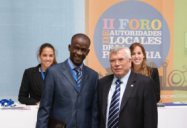
FEDERACION ESPAÑOLA DE MUNICIPIOS Y PROVINCIAS
- Contact |
- Who are we? |
- Site Map |
- Job offers
The integration of social diversity and cultural foundation for the development of cities in the periphery
From the conviction that another world is possible and that should start to be built from the cities, the mayors in the peripheries of large cities, meeting for three days in Getafe, have outlined the main lines of the policies that apply in their municipalities and which would be based on the integration of social and cultural diversity, a more sustainable urban planning and greater citizen participation.
Some factors that "will be key in the processes of innovation, creativity and competitiveness in which we work every day," as stated by the Mayor of Getafe and President of the FEMP, Pedro Castro, speaking at the closing ceremony of the Second Authorities Forum Local Periphery, FALP, which brought together some 700 Mayors and local authorities more than 20 countries to discuss the present and future of these cities that until recently were defined "dormitory" and, thanks to its growing development and evolution, is cities have become attractive, in the words of Councilman Getafe.
In the day's work showed that the peripheral cities are the receiving par excellence of the various migratory movements that have become strategic scenarios in the struggle for social inclusion called by implementing integration policies which prevent and mitigate potential social conflicts.These cities, explained Pedro Castro, have become "very dynamic space, characterized by its diversity and a great capacity for innovation."
The design of the city model has been present in discussions of the various presentations and workshops on all that has allowed and must continue to develop strategies agreed with all agencies and agents that make up the city and allow sustained and sustainable growth, both in the economic environment, and socially.
To ensure that peripheral cities become a satisfactory option, "in places truly livable and attractive", it is necessary, first, developing the notion of full citizenship, which is the legal recognition of rights and duties for all, especially the most vulnerable, and secondly, to ensure access to the welfare state, which is essential for the recognition of social rights of all residents in the city and allocated sufficient resources to ensure those rights.
Another aspect to consider is the promotion of decentralization of cultural activities, "as a means to increase the popular esteem, and construction of participatory spaces, providing them with facilities and public spaces able to accommodate citizens and civic initiatives. An effort that, according to Pedro Castro said, "can only be fully satisfactory, if public policies are developed in the surrounding areas are the result of the democratic participation of citizens and take into account the social capital that cities generate."
Getafe Mayor is confident that the democratic city of the XXI century will be built from the suburbs, "although it does not mean that the role of central cities is irrelevant, since they live in social and intellectual sectors that can contribute more structured to draft a metropolitan city. "
The members of the Red FALP who participated in the meeting of Getafe agreed that the Third Forum of Local Authorities of the periphery will be held in the African city of Dakar.
In the day's work showed that the peripheral cities are the receiving par excellence of the various migratory movements that have become strategic scenarios in the struggle for social inclusion called by implementing integration policies which prevent and mitigate potential social conflicts.These cities, explained Pedro Castro, have become "very dynamic space, characterized by its diversity and a great capacity for innovation."
The design of the city model has been present in discussions of the various presentations and workshops on all that has allowed and must continue to develop strategies agreed with all agencies and agents that make up the city and allow sustained and sustainable growth, both in the economic environment, and socially.
To ensure that peripheral cities become a satisfactory option, "in places truly livable and attractive", it is necessary, first, developing the notion of full citizenship, which is the legal recognition of rights and duties for all, especially the most vulnerable, and secondly, to ensure access to the welfare state, which is essential for the recognition of social rights of all residents in the city and allocated sufficient resources to ensure those rights.
Another aspect to consider is the promotion of decentralization of cultural activities, "as a means to increase the popular esteem, and construction of participatory spaces, providing them with facilities and public spaces able to accommodate citizens and civic initiatives. An effort that, according to Pedro Castro said, "can only be fully satisfactory, if public policies are developed in the surrounding areas are the result of the democratic participation of citizens and take into account the social capital that cities generate."
Getafe Mayor is confident that the democratic city of the XXI century will be built from the suburbs, "although it does not mean that the role of central cities is irrelevant, since they live in social and intellectual sectors that can contribute more structured to draft a metropolitan city. "
The members of the Red FALP who participated in the meeting of Getafe agreed that the Third Forum of Local Authorities of the periphery will be held in the African city of Dakar.

